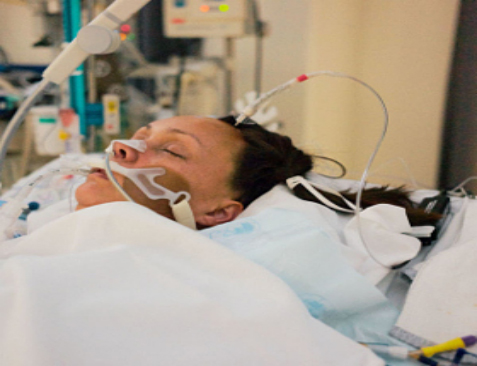Podcast: Play in new window | Download
Subscribe: Apple Podcasts | RSS
Hi, it’s Patrik Hutzel from INTENSIVECAREHOTLINE.COM where we instantly improve the lives for Families of critically ill Patients in Intensive Care, so that you can make informed decisions, have PEACE OF MIND, real power, real control and so that you can influence decision making fast, even if you’re not a doctor or a nurse in Intensive Care!
This is another episode of “YOUR QUESTIONS ANSWERED“ and in last week’s episode I answered another question from our readers and the question was
You can check out last week’s question by clicking on the link here.
In this week’s episode of “YOUR QUESTIONS ANSWERED” I want to answer questions from one of my clients Stephanie as part of my 1:1 consulting and advocacy service! Stephanie’s mother is on post- cardiac arrest care in the ICU and she is asking if the family has an option to let her stay in the ICU after the Tracheostomy.
My Mother is in the ICU for Post- Cardiac Arrest Care. Is Post- Tracheostomy a Step Away From the ICU Care?

Patrik: Right. Okay.
Stephanie: I’m going to walk through there now. Now that you’ve said that, I’m going to walk through there.
Patrik: Have a look. Have a look.
Stephanie: Mm-hmm (affirmative).
Patrik: Whereabouts are you? You are in Cincinnati. Are you in a big city or-
Stephanie: Yes, Ivory Oaks.
Patrik: Oh, you’re in Ivory Oaks. Okay.
Stephanie: Yeah, we’re right where St. Joseph … We’re in Ivory Oaks.
Patrik: Okay, so you’re in a pretty-
Stephanie: Yep. It’s Cincinnati-
Patrik: Yeah, yeah.
Stephanie: Yeah. She’s in a hospital called St. Joseph.
Recommended:
Patrik: Okay.
Stephanie: St. Joseph
Patrik: That’s a pretty-
Stephanie: It’s an old … Huh?
Patrik: That’s a pretty big organisation over on the East Coast, isn’t it? Because there are St. Joseph-
Stephanie: Yes.
Patrik: Hospitals in New York.
Stephanie: Yes. Yes. Well, see, the thing is that this was a private hospital mainly for Jewish people back in the 1800s or whenever they used it … whatever the year was they started the hospital. It is a private hospital. If you Google it, St. Joseph Hospital, Ivory Oaks, Cincinnati, it will give you a background on that hospital. They also, they take very good care of their own, if you will. That’s why that started it, but it’s not just for Jewish people. It’s for everybody. You know what I mean.
Patrik: Mm-hmm (affirmative).
Stephanie: Burnham, LTAC is right across the street from-
Patrik: Mm-hmm (affirmative).
Stephanie: From Burnham … From the hospital. That way, I guess, if they needed whatever, they could take of whoever. My niece is there. We’re not moving in that direction, bottom line. Bottom line.
Patrik: Yeah. I think that’s-
Stephanie: Why?
Patrik: I think you should get that trach done.
Stephanie: Mm-hmm (affirmative).
Patrik: And then keep her in the ICU. I’m just Googling that, St. Joseph Hospital, Ivory Oaks, Cincinnati. It’s having 2.7 stars out of 5.
Stephanie: Exactly. I saw that.
Patrik: Right.
Stephanie: I was like, what? Are you kidding?
Patrik: Mm-hmm (affirmative).
Stephanie: Yet they tout themselves as the centre for brain injury.
Recommended:
Patrik: Mm-hmm (affirmative).
Stephanie: Some people don’t like it. They say, “That hospital killed my mother or my father or my… whoever.”
Patrik: Sure.
Stephanie: You know? Personally, I don’t want to go there. I never did want to. If I ever have anything, I will never go there if I could help it. But the good thing for Carmen was that St. Joseph was around the corner from where she worked.
Patrik: Yeah, yeah. Of course.
Stephanie: That part was good.
Patrik: Yeah, yeah. The other thing that I’m wondering, I believe Carmen has dropped off the call, I believe. I can’t see her.
Stephanie: Oh, Miranda? You don’t see her? Okay, she probably has.
Patrik: I don’t see her.
Miranda: I’m here.
Stephanie: That’s okay.
Patrik: Oh, you’re here.
Stephanie: Oh, okay. Okay, yeah.
Patrik: Oh, there you are.
Stephanie: Okay, okay. Okay. Mm-hmm (affirmative).
Patrik: You’ve heard what we were talking about?
Recommended:
Miranda: Not completely. I heard about the size of the digs and things like that. That’s when I came back on the phone.
Stephanie: Okay.
Miranda: Basically, what y’all saying, what you’re saying, they basically saying once they do the trach, she can’t go in ICU no more.
Patrik: Well, that’s-
Miranda: They said she don’t have a reason for ICU.
Patrik: Well, their goal is to do a trach and get her out of ICU as quickly as possible. That’s their goal. But here is my concern, and we’ve talked about this on Wednesday, but here is my biggest concern. Especially since they still haven’t got the seizures controlled, right? And also, if patients go into LTAC they need to be at the point of rehabilitation. By no means is your mother at the point of rehabilitation if they can’t even control the seizures, right?
Stephanie: Mm-hmm (affirmative).
Patrik: That is the first step.
Stephanie: Mm-hmm (affirmative).
Patrik: They need-
Miranda: One minute they saying she’s not having seizures. Another minute she is. I can’t keep up with these people. I don’t know what-
Stephanie: Mm-hmm (affirmative). The brainstorm, or the neuro storm is not … She should not be released while she’s having those. They have to see how long she’s going to have those, monitor those, as far as I’m concerned. When our family speaks up with that, along with you, we’re speaking with one voice, Miranda. Don’t you worry, we’re not going to let them send her out of there. My thing is this Patrik, about the trach.
Recommended:
Patrik: Mm-hmm (affirmative).
Stephanie: This is what they’re saying. Once they give her the trach, they’re gonna move her … They will probably want to move her. They’ll watch her for 24 hours. They have a ventilation unit-
Patrik: Yep.
Stephanie: There in the hospital.
Patrik: Right.
Stephanie: We don’t want her moved there either, right?
Patrik: Right, right.
Stephanie: Right?
Patrik: Well-
Stephanie: I don’t know if we have to sign to have her moved there-
Patrik: Yeah, yeah.
Stephanie: Or not.
Patrik: Okay. Let me get clear on that. They have a ventilation unit in the hospital, but do they have-
Stephanie: Yep.
Patrik: They want her across the road in long-term acute care.
Stephanie: Yes, sir. Yes, sir.
Patrik: Right. The first step would be to get her out into the ventilation unit within the same hospital, and then the second step would be to get her onto LTAC–
Recommended:
Stephanie: Yep.
Patrik: Across the road.
Stephanie: Yes. Because I asked them how long do they stay in there?
Patrik: Right.
Stephanie: In the hospital.
Patrik: Right.
Stephanie: They say, “Oh, not long.”
Patrik: Right.
Stephanie: They even made it sound like she may not even have to go there. Like they could just ship her straight to Burnham across the street or one of the other ones.
Patrik: Yeah, yeah, yeah. Yep, yep.
Stephanie: See what I’m saying? He wanted to make us think that he would send her to the vent unit inside the hospital.
Patrik: Right.
Stephanie: The whole floor, that’s all they do.
Patrik: Yeah, yeah.
Stephanie: Yeah.
Patrik: Okay. What’s the name of the … Because I’m just on their website again.
Stephanie: Sure, sure.
Recommended:
Patrik: What’s the name of the LTAC across the road? Does that have a specific name?
Stephanie: Yes, it does. It’s called Burnham.
Patrik: Oh, yes.
Stephanie: B-U-R … Yeah. Uh-huh (affirmative).
Patrik: Yeah, I can see that, but it says Burnham Geriatric Centre and Hospital.
Stephanie: Yes.
Patrik: You know what geriatric stands for?
Stephanie: Yes. Ageing.
Patrik: Yes. That’s not … That sounds like a nursing home to me.
Stephanie: There you go. Right.
Patrik: Now I’m just looking this up.
Stephanie: [crosstalk]
Patrik: It says long-term care, comes up … Okay. Now I’m on their website. It says long-term care, and the first thing that comes up is comfort and hospice care. There is … Look, the first thing that I can see is there no talk about ventilator and weaning. There is no talk about that.
Stephanie: Mm-hmm (affirmative).
Miranda: Well, they say overall they do have the programme, even the guy that I talked to.
Patrik: Okay.
Stephanie: But he’s-
Miranda: Alexander Scott.
Patrik: Yep. Okay.
Recommended:
Stephanie: Go ahead, Patrik.
Patrik: If somebody has been in intensive care for four weeks … I’ll just give you this example. If somebody has been in Intensive Care for four weeks, and they spend at least two weeks out of those four weeks on a trach and they can’t be weaned off the ventilator and they’re stable, then I’d say if there’s a good LTAC maybe that’s an option. Maybe. If there is a good LTAC. In your mom’s situation, she’s not stable yet. They’re still trying to manage the neuro storms, they’re still trying to manage the seizures, right?
Stephanie: Mm-hmm (affirmative).
Patrik: They can’t manage that in LTAC. It’s not going to happen. They’re not qualified to do that. All they want at this point in time is send her out as quickly as possible.
Stephanie: Mm-hmm (affirmative). This is what the neurologist says. We don’t have a reason. When I told her, I said, “Aren’t you equipped to take care of a person indefinitely in ICU?”
Patrik: Mm-hmm (affirmative).
Stephanie: “Otherwise, you wouldn’t have an ICU unit.”
Patrik: Yes.
Stephanie: “Is that correct?” Yes, but we don’t want people to stay in here for whatever, and so she was saying, “But your mother doesn’t have a need.” That’s what she’s trying to say. “There’s no need to keep her in ICU, once we do the trach, there’s no need to keep her in ICU.”
Patrik: Yeah.
Stephanie: Right.
Patrik: Yeah.
Stephanie: Yeah.
Recommended:
- YOU DON’T KNOW WHAT YOU DON’T KNOW WHEN YOUR LOVED ONE IS CRITICALLY ILL IN INTENSIVE CARE! (PART 1)
- YOU DON’T KNOW WHAT YOU DON’T KNOW WHEN YOUR LOVED ONE IS CRITICALLY ILL IN INTENSIVE CARE! (PART 2)
Patrik: Let me ask you another question. With a cardiac arrest, there must be a cardiologist involved as well. Do you know anything about that?
Stephanie: Yeah, that’s Dr. Philipps. The other one that did the stent, Miranda.
Patrik: Right, right.
Stephanie: Uh-huh.
Patrik: What does he-
Stephanie: Yeah, but he hasn’t been around for a while. He just keeps saying … This is what they’re trained to do, as you know. He says, “Her heart is fine. Everything is working fine with her heart. I don’t deal with this part,” about her-
Patrik: Right.
Stephanie: When you talk about the seizures and brain-
Patrik: Right.
Stephanie: He says, “I don’t deal with that. You have to talk to them. I don’t deal with that.” He’s a good guy it seems like, but they’re all trained to don’t cross the other person’s path.
Patrik: Yep, yep. Sure. So he’s washing-
Stephanie: Right? Right?
Patrik: Yeah. He’s washing his hands clean. He doesn’t want to deal with it anymore.
Stephanie: There you go. There you go. Mm-hmm (affirmative).
Recommended:
Patrik: Right. Okay.
Stephanie: Tell me what you were thinking in terms of the cardiologist, though.
Patrik: What I was thinking if he’s washing his hands clean for now, that’s a sign to me that he probably thinks, okay, from a cardiology point of view he doesn’t need any input, and that’s probably a good sign for now.
Stephanie: Mm-hmm (affirmative).
Patrik: Then it will really come down to Neurology and Intensive Care to-
Stephanie: Yep.
Patrik: Potentially determine the next steps with you, not just over you.
Stephanie: Mm-hmm (affirmative).
Patrik: Would be with you-
Stephanie: Right.
Patrik: Not over you.
Stephanie: Yes.
Patrik: Right?
Stephanie: Yes. Mm-hmm (affirmative).
Patrik: I’m just trying to find out is there anybody else involved still in there, but it looks like it’s Neurology and ICU. They are the only two specialties at the moment.
Stephanie: Yep.
Patrik: Right.
Recommended:
Stephanie: Yep. It’s neurology, the Intensive Neurologist, and Dr. Philipps, who is the senior attending physician for ICU, that has been attending to Carmen for a while. There was another one, he was an Indian doctor. He seemed like he cared a little bit more than Dr. Philipps did, but Dr. Philipps is on it, too, because if his resident doesn’t do something or stops something, he’s on him. When they had that little meeting, he said, “Wait a minute. Are you doing this? Are you doing that? You’re going to do this, do that,” so it seems like he’s on it as far as that is concerned. I guess they do that to make sure they don’t lose their licence or whatever.
Patrik: Yeah, probably.
Stephanie: Make you think they really care.
Patrik: Yeah.
Stephanie: Yeah, exactly.
The 1:1 consulting session will continue in next week’s episode.
How can you become the best advocate for your critically ill loved one, make informed decisions, get peace of mind, control, power and influence quickly, whilst your loved one is critically ill in Intensive Care?
You get to that all important feeling of making informed decisions, get PEACE OF MIND, CONTROL, POWER AND INFLUENCE when you download your FREE “INSTANT IMPACT” report NOW by entering your email below!
In Your FREE “INSTANT IMPACT” report you’ll learn quickly how to make informed decisions, get PEACE OF MIND, real power and real control and how you can influence decision making fast, whilst your loved one is critically ill in Intensive Care! Your FREE “INSTANT IMPACT” Report gives you in-depth insight that you must know whilst your loved one is critically ill or is even dying in Intensive Care!
Sign up and download your FREE “INSTANT IMPACT” REPORT now by entering your email below! In your FREE “INSTANT IMPACT” REPORT you’ll learn how to speak the “secret” Intensive Care language so that the doctors and the nurses know straight away that you are an insider and that you know and understand what’s really happening in Intensive Care! In your FREE report you’ll also discover
- How to ask the doctors and the nurses the right questions
- Discover the many competing interests in Intensive Care and how your critically ill loved one’s treatment may depend on those competing interests
- How to eliminate fear, frustration, stress, struggle and vulnerability even if your loved one is dying
- 5 mind blowing tips & strategies helping you to get on the right path to making informed decisions, get PEACE OF MIND, control, power and influence in your situation
- You’ll get real world examples that you can easily adapt to you and your critically ill loved one’s situation
- How to stop being intimidated by the Intensive Care team and how you will be seen as equals
- You’ll get crucial ‘behind the scenes’ insight so that you know and understand what is really happening in Intensive Care
- How you need to manage doctors and nurses in Intensive Care (it’s not what you think)
Thank you for tuning into this week’s YOUR QUESTIONS ANSWERED episode and I’ll see you again in another update next week!
Make sure you also check out our “blog” section for more tips and strategies or send me an email to [email protected] with your questions!
Also, have a look at our membership site INTENSIVECARESUPPORT.ORG for families of critically ill Patients in Intensive Care here.
Or you can call us! Find phone numbers on our contact tab.
Also check out our Ebook section where you get more Ebooks, Videos and Audio recordings and where you can also get 1:1 counselling/consulting with me via Skype, over the phone or via email by clicking on the products tab!
This is Patrik Hutzel from INTENSIVECAREHOTLINE.COM and I’ll see you again next week with another update!







